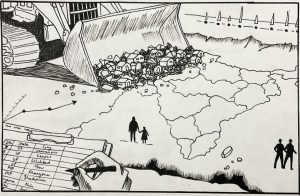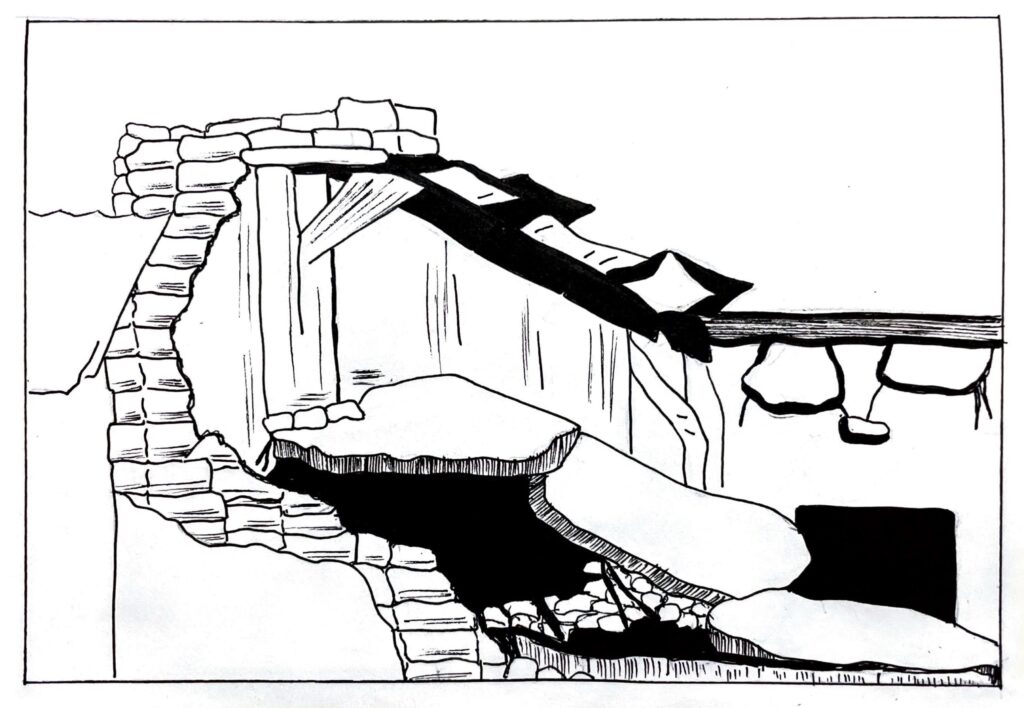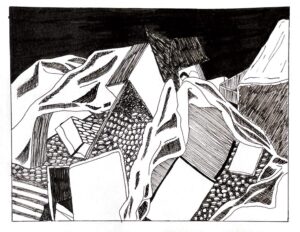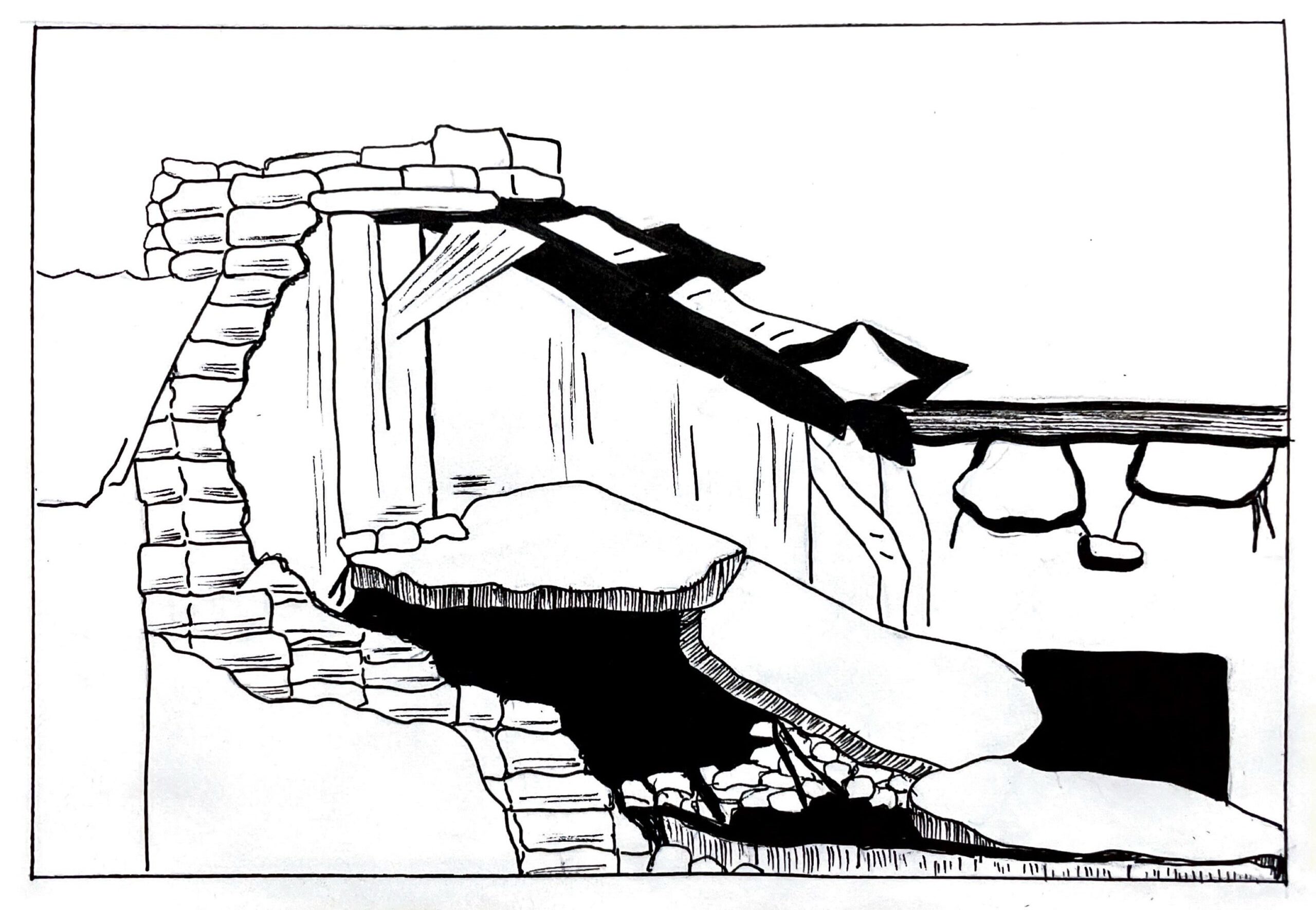
The many demolitions of Shama Begum’s life and property

In the quiet lanes of Shahpura, a modest town in Madhya Pradesh’s Dindori district, stood a home that had quietly witnessed twenty-two years of shared joys, quiet struggles, and dreams. This humble dwelling, built painstakingly over six years, represented a lifetime of memories for Shama Begum, Halim Khan and their son, Asif Khan, who was born the same year they moved into the house. Then, on the morning of 3 April 2022, as the second day of Ramadan dawned softly over the town, the fabric of their lives began unraveling.
The family had risen for sehri, partaking in a simple meal before the day’s fast commenced. Shortly after the fajr (dawn) prayer, as the first light of day crept over Shahpura, Asif received an unexpected phone call from Sakshi Sahu, a Hindu woman with whom he was in a relationship. Sakshi, separated from Asif by her family because she was in an interfaith relationship with a Muslim man, had made a desperate plea for help. She had decided to escape from her family, who were going to send her away to distant relatives, effectively isolating her from the world she knew. The couple eloped.
As the morning advanced, Sakshi’s family arrived at Halim and Shama’s doorstep searching for their daughter, accusing their son of abducting her, despite knowing that she had eloped willingly, in order to escape her family. But the family threatened to lodge a police complaint of kidnapping. In the times of “bulldozer justice,” even ordinary civilians like Sakshi’s family knew how the targeting of Muslims operates, and threatened to have their home destroyed. Halim and Shama pleaded innocence, unaware of their son’s whereabouts or intentions. Around mid-morning, Asif briefly switched on his phone, allowing a desperate conversation with his father. Halim’s voice trembled as he begged his son to return home with Sakshi. “Beta, hamara ghar toot jaega,” he pleaded. (Son, our home will be destroyed.) Turning to Sakshi over the phone, Halim’s voice broke with emotion, “Tum vapis aajao, mai tumhare mummy papa se baat karunga, lekin tum vapis aajao”—Please come back; I will speak to your parents myself, just return. Despite his desperate plea, fear drove Sakshi’s determination; she refused to return. By the evening, an FIR was lodged, and the police swiftly took Halim into custody, plunging the family into deeper uncertainty.
As the town grew hostile and fearful tensions escalated, Shama and her daughter fled their home with just a handful of clothes, hiding their identities, seeking refuge from house to house, knocking on doors that rarely opened. Relatives, wary of repercussions, offered little more than sympathetic silence.
Shama’s voice breaks with sorrow recalling those days: “Jo baat pehle thi, ab vo nahi hai baat. Nazrein badal jaati hai jab sab khatam ho jata hai.” (What once was, is no longer the same. People’s gazes change once everything is lost.) During this turmoil, even food became scarce. The holy month of fasting, Ramadan, turned into an endurance test of poverty and humiliation. “Pani pi kar sehri karti thi aur uncle hi paanch rupaye wali namkeen le aate the jis se mai roza kholti thi.” (I would have water for sehri, and uncle would bring a five-rupee snack for iftar.)
On April 8, just five days after that fateful phone call, bulldozers arrived without warning, without due process, shattering their entire life within moments. Shama watched helplessly over a video call as the bulldozers flattened their home and two shops—one, a confectionery run by Asif; and the other, a cybercafe operated by his younger brother. Both Asif and his brother used to run these small businesses after school hours to sustain the family. The house, legally in Halim’s name, that he had lovingly announced within his family is his gift to Shama as part of her meher (marital dowry), crumbled into dust. The demolition stripped them of both shelter and income, plunging them into a chasm of uncertainty.
Shama recalls the devastating scene vividly: “Video call par ghar ko toot-te dekh rahi thi, 22 saal ki grihasti ek din mein bikhar gayi.” (I watched over video call as our home was destroyed; 22 years of household shattered in one day.) Her voice, still raw from the trauma, revealed the emotional upheaval that still continues. “Jab ghar tootta hai na beta, toh ghar ke saath hi insan ki khwahish, uske khwab, uski har ek chhoti badi aarzu sab toot jaati hai. Yahan tak ki us insan ki jeene ki khwahish bhi toot jaati hai. Ye bulldozer ek ghar par nahi, balki ek saath kai zindagiyon par chala diya jata hai beta.” (When a home is destroyed, my child, along with it shatter all of a person’s desires, dreams, small and big aspirations, even their will to live. This bulldozer doesn’t crush one home; it destroys many lives simultaneously.)
The authorities justified the demolition by claiming that the Khan family’s home and shops were constructed on “encroached government land,” and that the structures were “illegal.” The façade of these false justifications was laid bare by the administration’s celebration of the demolition on social media. The Dindori district collector posted photos of the demolition on X, stating, “Collector Shri Ratnakar Jha has razed the shop and house of accused Asif Khan in the case of kidnapping of a student in Dindori district. Action has been taken against the shops and illegal house of accused Asif Khan for two days.”
The claim of it being an illegal construction, however, stands in direct contradiction to the family’s documents and testimony. The land, as Shama repeatedly states, was allotted to them with a valid patta—an official land deed—in her and Halim’s names. The house had been standing for over two decades, constructed under the Indira Awaas Yojana, a state-supported housing scheme for the rural poor. No prior notice was served, no opportunity was given to contest the claim, and no procedure under the law was followed before bulldozers arrived. In reality, the so-called illegality functioned less as a legal category and more as a justification, a tool used to mete out collective punishment to a Muslim family caught in the crosshairs of a communal controversy.
But the devastation went beyond the physical. It fractured a family’s place in society. Today, they live in a rented house, but the sense of displacement remains. Their sons, once self-sufficient, now struggle to find employment, their names shadowed by stigma. Halim, once a sturdy presence in the household, is now plagued by a fragile heart, fluctuating blood pressure, and the weight of deepening illness.
“Life is made meaningless by bulldozing homes,” Shama said, eyes cast down. “This should not happen to anyone.” Her words are not just grief, but a reflection of what many like her carry in silence. She pauses before adding, “We only think that if someone is guilty, give them notice first, and if they truly are, punish them after an inquiry.”
In the weeks that followed the demolition, when the dust had settled but the ache remained raw, the Madhya Pradesh High Court intervened, responding to the petition filed by Sakshi asserting that she had married Asif of her own free will. But the court did not direct any redressal for what had already been lost, did not hold any state or police official accountable for the illegal, punitive actions, but only acted to prevent further harm. It ordered the police to refrain from acting on the abduction charges filed against Asif and directed that the couple be given protection from societal and familial coercion. For the Shama and Halim, this legal nod came too late to save their home, their livelihood, or their dignity, but it stood as a faint acknowledgment that what had happened was not just cruel, but deeply unjust. Meanwhile the community’s response was a mix of sympathy and apprehension. Many distanced themselves, fearing association might invite similar repercussions. Amidst the darkness, one sliver of relief came from Aasif Mujtaba of the Miles2Smile Foundation, who offered immediate support. His NGO provided the family with essential relief, offering a semblance of stability in their uprooted lives. Shama expresses profound gratitude for this support that was not just logistical for them at the time; it was a crucial act of kindness during their darkest hours.
These demolitions were never about justice. It was punishment delivered without trial—swift, public, and absolute. It was a message meant for others: a deterrent veiled as law and order. The family was never proven guilty of anything. And yet, they live with a punishment far worse than a sentence. Their case remains in legal limbo. The petition challenging the demolition has not been taken up. Every court hearing is delayed, every date postponed. “Listing number keeps getting lower on the list as we wait for justice,” Shama says. It is a wait without end. “We have been set back by twenty years. It’s Ramadan now, but there’s no way we can prepare to celebrate Eid,” she says quietly. It’s a month of reflection and grief, marked not by prayer alone but by the weight of what has been lost.
This is not simply a story of a house torn down. It is the story of a life interrupted, of a family thrust into the margins, of justice denied, and of the invisible bruises of living in fear. It is about the many others like the Shama and Halim who live beneath the looming shadow of bulldozers, waiting—hoping—to be spared.
Related Posts
In the quiet lanes of Shahpura, a modest town in Madhya Pradesh’s Dindori district, stood a home that had quietly witnessed twenty-two years of shared joys, quiet struggles, and dreams. This humble dwelling, built painstakingly over six years, represented a lifetime of memories for Shama Begum, Halim Khan and their son, Asif Khan, who was born the same year they moved into the house. Then, on the morning of 3 April 2022, as the second day of Ramadan dawned softly over the town, the fabric of their lives began unraveling.
The family had risen for sehri, partaking in a simple meal before the day’s fast commenced. Shortly after the fajr (dawn) prayer, as the first light of day crept over Shahpura, Asif received an unexpected phone call from Sakshi Sahu, a Hindu woman with whom he was in a relationship. Sakshi, separated from Asif by her family because she was in an interfaith relationship with a Muslim man, had made a desperate plea for help. She had decided to escape from her family, who were going to send her away to distant relatives, effectively isolating her from the world she knew. The couple eloped.
As the morning advanced, Sakshi’s family arrived at Halim and Shama’s doorstep searching for their daughter, accusing their son of abducting her, despite knowing that she had eloped willingly, in order to escape her family. But the family threatened to lodge a police complaint of kidnapping. In the times of “bulldozer justice,” even ordinary civilians like Sakshi’s family knew how the targeting of Muslims operates, and threatened to have their home destroyed. Halim and Shama pleaded innocence, unaware of their son’s whereabouts or intentions. Around mid-morning, Asif briefly switched on his phone, allowing a desperate conversation with his father. Halim’s voice trembled as he begged his son to return home with Sakshi. “Beta, hamara ghar toot jaega,” he pleaded. (Son, our home will be destroyed.) Turning to Sakshi over the phone, Halim’s voice broke with emotion, “Tum vapis aajao, mai tumhare mummy papa se baat karunga, lekin tum vapis aajao”—Please come back; I will speak to your parents myself, just return. Despite his desperate plea, fear drove Sakshi’s determination; she refused to return. By the evening, an FIR was lodged, and the police swiftly took Halim into custody, plunging the family into deeper uncertainty.
As the town grew hostile and fearful tensions escalated, Shama and her daughter fled their home with just a handful of clothes, hiding their identities, seeking refuge from house to house, knocking on doors that rarely opened. Relatives, wary of repercussions, offered little more than sympathetic silence.
Shama’s voice breaks with sorrow recalling those days: “Jo baat pehle thi, ab vo nahi hai baat. Nazrein badal jaati hai jab sab khatam ho jata hai.” (What once was, is no longer the same. People’s gazes change once everything is lost.) During this turmoil, even food became scarce. The holy month of fasting, Ramadan, turned into an endurance test of poverty and humiliation. “Pani pi kar sehri karti thi aur uncle hi paanch rupaye wali namkeen le aate the jis se mai roza kholti thi.” (I would have water for sehri, and uncle would bring a five-rupee snack for iftar.)
On April 8, just five days after that fateful phone call, bulldozers arrived without warning, without due process, shattering their entire life within moments. Shama watched helplessly over a video call as the bulldozers flattened their home and two shops—one, a confectionery run by Asif; and the other, a cybercafe operated by his younger brother. Both Asif and his brother used to run these small businesses after school hours to sustain the family. The house, legally in Halim’s name, that he had lovingly announced within his family is his gift to Shama as part of her meher (marital dowry), crumbled into dust. The demolition stripped them of both shelter and income, plunging them into a chasm of uncertainty.
Shama recalls the devastating scene vividly: “Video call par ghar ko toot-te dekh rahi thi, 22 saal ki grihasti ek din mein bikhar gayi.” (I watched over video call as our home was destroyed; 22 years of household shattered in one day.) Her voice, still raw from the trauma, revealed the emotional upheaval that still continues. “Jab ghar tootta hai na beta, toh ghar ke saath hi insan ki khwahish, uske khwab, uski har ek chhoti badi aarzu sab toot jaati hai. Yahan tak ki us insan ki jeene ki khwahish bhi toot jaati hai. Ye bulldozer ek ghar par nahi, balki ek saath kai zindagiyon par chala diya jata hai beta.” (When a home is destroyed, my child, along with it shatter all of a person’s desires, dreams, small and big aspirations, even their will to live. This bulldozer doesn’t crush one home; it destroys many lives simultaneously.)
The authorities justified the demolition by claiming that the Khan family’s home and shops were constructed on “encroached government land,” and that the structures were “illegal.” The façade of these false justifications was laid bare by the administration’s celebration of the demolition on social media. The Dindori district collector posted photos of the demolition on X, stating, “Collector Shri Ratnakar Jha has razed the shop and house of accused Asif Khan in the case of kidnapping of a student in Dindori district. Action has been taken against the shops and illegal house of accused Asif Khan for two days.”
The claim of it being an illegal construction, however, stands in direct contradiction to the family’s documents and testimony. The land, as Shama repeatedly states, was allotted to them with a valid patta—an official land deed—in her and Halim’s names. The house had been standing for over two decades, constructed under the Indira Awaas Yojana, a state-supported housing scheme for the rural poor. No prior notice was served, no opportunity was given to contest the claim, and no procedure under the law was followed before bulldozers arrived. In reality, the so-called illegality functioned less as a legal category and more as a justification, a tool used to mete out collective punishment to a Muslim family caught in the crosshairs of a communal controversy.
But the devastation went beyond the physical. It fractured a family’s place in society. Today, they live in a rented house, but the sense of displacement remains. Their sons, once self-sufficient, now struggle to find employment, their names shadowed by stigma. Halim, once a sturdy presence in the household, is now plagued by a fragile heart, fluctuating blood pressure, and the weight of deepening illness.
“Life is made meaningless by bulldozing homes,” Shama said, eyes cast down. “This should not happen to anyone.” Her words are not just grief, but a reflection of what many like her carry in silence. She pauses before adding, “We only think that if someone is guilty, give them notice first, and if they truly are, punish them after an inquiry.”
In the weeks that followed the demolition, when the dust had settled but the ache remained raw, the Madhya Pradesh High Court intervened, responding to the petition filed by Sakshi asserting that she had married Asif of her own free will. But the court did not direct any redressal for what had already been lost, did not hold any state or police official accountable for the illegal, punitive actions, but only acted to prevent further harm. It ordered the police to refrain from acting on the abduction charges filed against Asif and directed that the couple be given protection from societal and familial coercion. For the Shama and Halim, this legal nod came too late to save their home, their livelihood, or their dignity, but it stood as a faint acknowledgment that what had happened was not just cruel, but deeply unjust. Meanwhile the community’s response was a mix of sympathy and apprehension. Many distanced themselves, fearing association might invite similar repercussions. Amidst the darkness, one sliver of relief came from Aasif Mujtaba of the Miles2Smile Foundation, who offered immediate support. His NGO provided the family with essential relief, offering a semblance of stability in their uprooted lives. Shama expresses profound gratitude for this support that was not just logistical for them at the time; it was a crucial act of kindness during their darkest hours.
These demolitions were never about justice. It was punishment delivered without trial—swift, public, and absolute. It was a message meant for others: a deterrent veiled as law and order. The family was never proven guilty of anything. And yet, they live with a punishment far worse than a sentence. Their case remains in legal limbo. The petition challenging the demolition has not been taken up. Every court hearing is delayed, every date postponed. “Listing number keeps getting lower on the list as we wait for justice,” Shama says. It is a wait without end. “We have been set back by twenty years. It’s Ramadan now, but there’s no way we can prepare to celebrate Eid,” she says quietly. It’s a month of reflection and grief, marked not by prayer alone but by the weight of what has been lost.
This is not simply a story of a house torn down. It is the story of a life interrupted, of a family thrust into the margins, of justice denied, and of the invisible bruises of living in fear. It is about the many others like the Shama and Halim who live beneath the looming shadow of bulldozers, waiting—hoping—to be spared.
SUPPORT US
We like bringing the stories that don’t get told to you. For that, we need your support. However small, we would appreciate it.






